In order to have a well-running machine, you must learn how to tune a car. Although it may seem like a daunting task, with a little bit of elbow grease and the proper tools, anyone can learn how to tune a car.
By following these simple steps, you’ll have your car running like new in no time!
Check Your Car’s Engine Oil
The engine oil should be checked every 3,000 miles or 6 months, whichever comes first. Make sure to check your car’s manual for the recommended type of oil and how much you need.
Check The Air Filter
Your car will run smoother if its air filter is clean and free of debris. You can either replace the filter completely or use a vacuum to clean it out.
Change Spark Plugs & Wires
Spark plugs and wires are an important part of how your car runs. Over time, they can become worn out and need replacing. Make sure to change them as necessary.
Replace The Fuel Filter
The fuel filter should be checked every 15,000-20,000 miles and changed if necessary. A clogged fuel filter can lead to poor gas mileage and performance.
Check The Belts & Hoses
Belts and hoses can also become worn and need replacing. Make sure to inspect them regularly for signs of wear or fraying and replace them as needed.
These are just a few tips on how to tune a car. With the right tools and some time, anyone can learn how to tune a car properly. With regular maintenance, your car will be running like new again in no time!
How To Adjust Your Car’s Settings For Optimal Driving
In order to have a safe and comfortable drive, it is important that your car is properly tuned. Here are the basic steps you need to take in order to adjust your car’s settings for optimal driving.
Check The Tire Pressure
Tire pressure is a key factor to consider when tuning your car. The right amount of pressure ensures that your vehicle will perform at its best, while too little or too much can cause problems. Make sure you check the recommended tire pressure for your car before making any adjustments.
Adjust Alignment And Suspension
Aligning and adjusting the suspension components of your car helps improve how it handles different surfaces and how it responds when turning corners. The properly adjusted suspension also helps reduce wear on tires and other parts of the vehicle over time.
Tune Engine Parameters
Tuning the engine parameters such as spark plug gap, fuel injection timing, air/fuel ratio, camshaft position, etc. can improve how your engine runs and how much power it produces. Make sure you consult a professional before attempting to make any adjustments to these settings.
Adjust The Brakes
The braking system of your car is responsible for stopping safely and quickly when needed, so it’s important that it is properly adjusted for optimal functioning. Have a qualified mechanic check the brake pads, rotors, lines, calipers, and other parts of the braking system at least once a year or whenever you notice something unusual about how your vehicle stops.
Calibrate Speedometer
A calibrated speedometer ensures that you know how fast you are going at all times which can be critical in certain situations. Check your owner’s manual to find out how to calibrate the speedometer of your car, or have it done professionally.
What You Need To Know Before Tuning Your Car
There are many things you need to take into account before tuning your car. The most important factor is how much money you’re willing to spend on the process. You also need to decide what specific aspects of your car you want to improve-its engine, its suspension, or its exterior and interior design. Once you’ve made those decisions, it’s time to start looking for a good mechanic who can help you tune your car the way you want it!
Engine Tuning
Tuning your car’s engine is essential if you want to increase its power, performance, and efficiency. It involves adjusting the fuel/air mixture, ignition timing, and compression ratio in order to improve how your engine runs. You can also tweak other settings such as camshaft duration, valve lift, and exhaust system configuration to get even more out of your engine. However, tuning an engine requires a lot of knowledge and experience, so you should make sure that the mechanic you hire has plenty of both!
Suspension Tuning
Another way to tune your car is by adjusting its suspension setup. There are many different aspects that affect how well a car will handle; from shock absorbers and coil springs to anti-roll bars and bushings. By changing how these components interact with one another, you can drastically alter how your car performs on the road. This type of tuning requires an experienced mechanic who knows how to work with the parts and make sure everything is perfectly balanced for maximum performance.
Exterior And Interior Tuning
If you’re looking to customize your car’s look, then tuning its exterior and interior is a great way to do so. You can add accessories such as spoilers, body kits, custom paint jobs, and decals in order to give it a unique style that will turn heads wherever you go. On the inside, you can install audio systems, gauges, and other goodies to give your ride a more luxurious feel.
No matter how you choose to tune your car, make sure that you always prioritize safety and quality over anything else. Also, be aware of the legal requirements in your area; some modifications may require special permits or inspection reports before they can be used on public roads. With the right knowledge and resources, you can achieve amazing results with a tuned-up car! Enjoy the ride!
Conclusion:
Tuning a car may seem like a daunting task but with patience and elbow grease anyone can do it! By following these simple steps changing the oil checking all fluids, and replacing filters you’ll have your machine running like new again in no time!
You May Also Like The Following:


